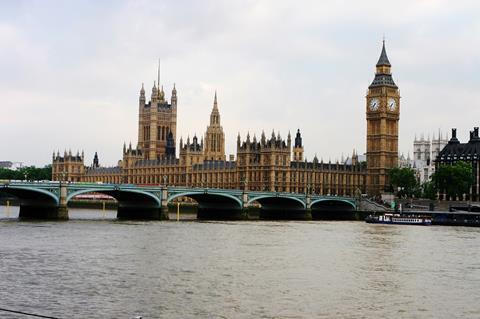Labour-led revolt means government cannot now reintroduce amendment to Levelling Up and Regeneration Bill
The government has been defeated in the House of Lords over its plan to relax nutrient pollution rules for housing developments.

Peers voted by 191 votes to 161 to reject the government’s amendment to the Levelling Up and Regeneration Bill which would have required councils to ignore evidence of nutrient pollution from housing development sites.
However, Labour peers last night led a successful revolt against the plan and parliamentary procedure means the government cannot now re-introduce the amendment when the bill returns to the Commons.
In the debate yesterday, levelling up minister Baroness Scott stressed the “urgency” of the need for interventions to resolve the nutrient issue, which has been estimated by industry to be holding up 150,000 homes.
She said: “The government believes action is needed now to get on with housebuilding.
“Our plan would do that while protecting the environment. What is being proposed instead [by Labour] amounts to dithering and delay—and adds confusion rather than clarity.”
Scott also said the assumption it would be asking councils to make is limited to developments where wastewater has been treated by a regulated treatment works, and that secondly there is a package of mitigations to offset the nutrient flows.
However, Labour spokesperson Baroness Hayman said that while the current nutrients rules do not work, the government’s proposed solution didn’t either.
Hayman said “We certainly do not agree with the powers being introduced…[it]…means abandoning legal protections for the nation’s most precious and sensitive habitats, on the premise that this is the only way to increase housing supply.
“As we have heard from noble Lords, this is completely wrong. It is entirely possible to balance the need for more homes with the need to protect nature.”
Hayman instead called for a “a public consultation to consider the alternatives, allowing for an evidence-based approach that the government’s new schedule completely lacks”.
Labour peer Lord Best described the current rules as an “arbitrary, damaging and unfair housing ban” and said something must change, saying he has heard evidence that less than 5% of the problem was attributable to new homebuilding.
However, he described the government’s proposal to take nutrient neutrality out of consideration for planners altogether as a “pretty crude approach.”
He said: “A long-term solution has to address the intensive farming issues and get on top of the water company failures. A more considered and comprehensive policy change with clear guidance for planners and practitioners needs to set nutrient neutrality alongside water neutrality and all the other nature recovery measures.”
The government’s proposals were also attacked by Conservative peers, with former environment secretary Lord Deben, now chair of the Climate Change Committee, accusing the government of “not being conservative”. He said: “They are asking local authorities—I can hardly believe it—to disregard the facts. This is the kind of attitude that we see in the Republican Party in the United States, the people who do not believe in climate change, the anti-vaxxers, who say “Don’t look at the facts”.
“This is one of the worst pieces of legislation I have ever seen, and I have been around a long time”, adding that if it the changes were so obvious and so vital, the government should have put in the bill from the start.
��ɫ����TV’s sister title Housing Today’s calls on the government to act strategically to tackle the nutrients issue.
Responding to the vote, Stewart Baseley, executive chair of the Home Builders Federation, described the government’s handling of the nutrient neutrality issue as a “national disgrace.”
He said: “Amidst an acute housing shortage and with housing supply plummeting it is a damming indictment that after four years politicians have completely failed to find a solution.
“Despite the occupants of new homes making a negligible contribution to the issue, and house builders giving water companies over £1bn in the past three years alone, the impasse goes on.
“Extending the ban will do nothing to improve the shocking state of our rivers, polluted by agricultural runoff and the failings of water companies, but will exacerbate our housing crisis still further.
“With growing waiting lists, a generation unable to buy, local economies damaged, and jobs lost, the mishandling of this issue is a national disgrace.”




















No comments yet